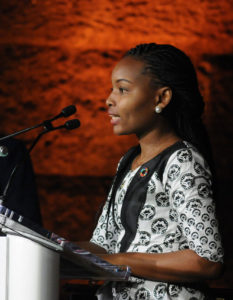by Ben Taylor
Tanzanian gender rights activist, Rebeca Gyumi, has been awarded the prestigious UN Human Rights Prize.
Miss Gyumi is the 31-year-old Founder & Executive Director at Msichana Initiative, a civil society organization which aims to empower girls through education and addresses challenges which limit girls’ right to education. She has worked for over eight years with an organization working on youth, as a TV personality and youth advocate. Ms. Gyumi challenged the constitutionality of section 13 and 17 of The Law of Marriage Act of 1971 that allowed girls to marry at the age of 14 and 15 where there is parental consent or court’s sanction. She won the case before the High Court of Tanzania in 2016.
“I was pretty much shocked. So shocked and caught unaware that I was even considered for such a prestigious prize,” she said.
Rebeca had previous won the UNICEF Global Goal Award in 2016, and was named 2016 Woman of the Year by New Africa Magazine.
The Prize, established by the General Assembly in 1966 (A/RES/21/2217), was awarded for the first time in 1968 on the occasion of the 20th anniversary of the Universal Declaration of Human Rights, on what is now known as Human Rights Day, 10 December.
This is the tenth award of the prize, coinciding this year with the 70th anniversary of the Universal Declaration of Human Rights. Previous winners have included Eleanor Roosevelt, Martin Luther King, Nelson Mandela, Jimmy Carter, Denis Mukwege, Malala Yusafzai, Amnesty International and the International Committee of the Red Cross (ICRC).
Gyumi first saw the injustice around her as a 13-year-old, when some of her schoolmates dropped out of school because of pregnancy and were married off.
A few years later, while studying law at University, she learned about the Law of Marriage Act of 1971 and saw the potential in trying to mount a legal challenge against it. “It bothered me that the age for boys to be married was 18 but for girls it was 14,” she said.
In 2016, with just a couple of years’ experience as a lawyer, Gyumi and her colleagues started work on a legal case to petition against the Marriage Act, compiling reports to prove that child marriage for girls was an serious issue nationwide and why it needed to be stopped.
They won their case; the High Court ruled that sections 13 and 17 of the Marriage Act were unconstitutional and that the age for girls to legally marry should be raised to 18.
“I was so happy that day for the fact that a girl child had won. I was overwhelmed with joy,” she says. “I felt duty bound to fight for the girls I had interacted with. They didn’t have enough information to know how to challenge what was happening to them.”
Though her success was celebrated by many around the country, not everyone was happy. She was attacked for promoting a “Western culture”, and the government launched an appeal against the ruling in 2017, arguing that child marriage can actually protect girls who get pregnant out of wedlock.
The case is currently in Tanzania’s high court with a verdict due soon.
“For me I feel like we are at the moment where our country really needs to defend girls’ rights,” said Rebeca. “This appeal does not send a good message of our country’s intention to protect girls generally. It will look really bad on the government if they win. There is no victory in winning a case that allows girls to get married younger. It’s not a victory a country can be proud of.”
Winning the 2018 Human Rights Prize puts Gyumi on the international stage alongside other activists such as Malala Yousafzai, Denis Mukwege and Nelson Mandela, and it’s not something she takes lightly.
“It’s not just a personal honour but my country’s honour, putting our country on the map. It’s a proud moment for me and for the girls I stood up for and for the ongoing global progress that is happening around girls’ and women’s rights.”
Asked by CNN what her message is to other young girls out there, her answer was simple: “I encourage you today to be brave and stand up for your truth.”

